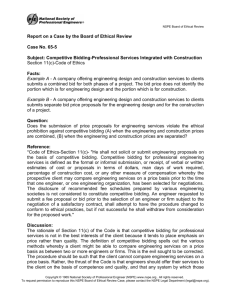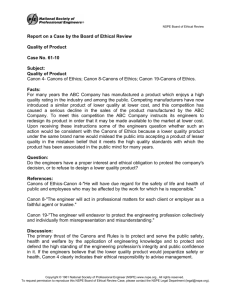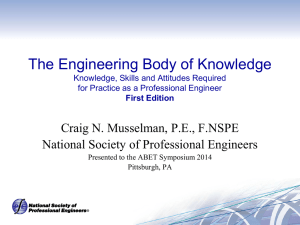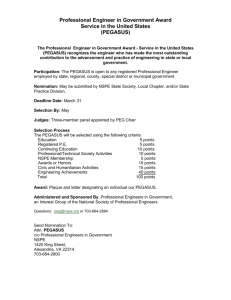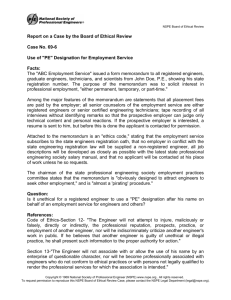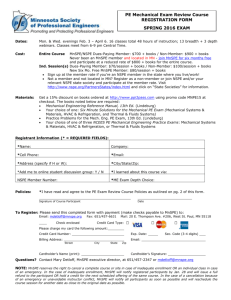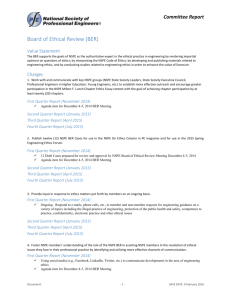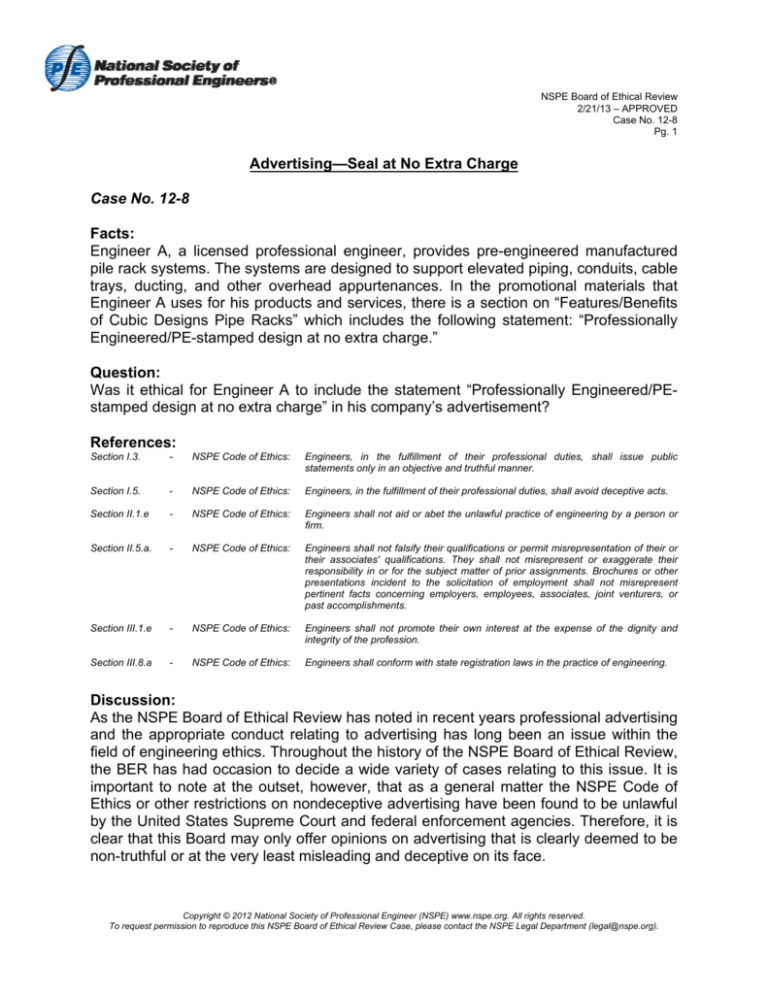
NSPE Board of Ethical Review
2/21/13 – APPROVED
Case No. 12-8
Pg. 1
Advertising—Seal at No Extra Charge
Case No. 12-8
Facts:
Engineer A, a licensed professional engineer, provides pre-engineered manufactured
pile rack systems. The systems are designed to support elevated piping, conduits, cable
trays, ducting, and other overhead appurtenances. In the promotional materials that
Engineer A uses for his products and services, there is a section on “Features/Benefits
of Cubic Designs Pipe Racks” which includes the following statement: “Professionally
Engineered/PE-stamped design at no extra charge.”
Question:
Was it ethical for Engineer A to include the statement “Professionally Engineered/PEstamped design at no extra charge” in his company’s advertisement?
References:
Section I.3.
-
NSPE Code of Ethics:
Engineers, in the fulfillment of their professional duties, shall issue public
statements only in an objective and truthful manner.
Section I.5.
-
NSPE Code of Ethics:
Engineers, in the fulfillment of their professional duties, shall avoid deceptive acts.
Section II.1.e
-
NSPE Code of Ethics:
Engineers shall not aid or abet the unlawful practice of engineering by a person or
firm.
Section II.5.a.
-
NSPE Code of Ethics:
Engineers shall not falsify their qualifications or permit misrepresentation of their or
their associates' qualifications. They shall not misrepresent or exaggerate their
responsibility in or for the subject matter of prior assignments. Brochures or other
presentations incident to the solicitation of employment shall not misrepresent
pertinent facts concerning employers, employees, associates, joint venturers, or
past accomplishments.
Section III.1.e
-
NSPE Code of Ethics:
Engineers shall not promote their own interest at the expense of the dignity and
integrity of the profession.
Section III.8.a
-
NSPE Code of Ethics:
Engineers shall conform with state registration laws in the practice of engineering.
Discussion:
As the NSPE Board of Ethical Review has noted in recent years professional advertising
and the appropriate conduct relating to advertising has long been an issue within the
field of engineering ethics. Throughout the history of the NSPE Board of Ethical Review,
the BER has had occasion to decide a wide variety of cases relating to this issue. It is
important to note at the outset, however, that as a general matter the NSPE Code of
Ethics or other restrictions on nondeceptive advertising have been found to be unlawful
by the United States Supreme Court and federal enforcement agencies. Therefore, it is
clear that this Board may only offer opinions on advertising that is clearly deemed to be
non-truthful or at the very least misleading and deceptive on its face.
Copyright © 2012 National Society of Professional Engineer (NSPE) www.nspe.org. All rights reserved.
To request permission to reproduce this NSPE Board of Ethical Review Case, please contact the NSPE Legal Department (legal@nspe.org).
NSPE Board of Ethical Review
2/21/13 – APPROVED
Case No. 12-8
Pg. 2
As noted, while the issue of advertising has long been a subject of this Board, many if
not most of this Board’s opinions relating to advertising were decided under an earlier
version of the NSPE Code of Ethics, which at the time deemed as unethical certain
types of advertising determined to be unprofessional, including “self-laudatory
comments.” An example of such language was the early BER Case No. 64-8, where an
engineering firm inserted in a magazine, circulated primarily to business subscribers, a
full-page advertisement consisting of text and one simple illustration intended to depict
savings in capital costs which could be accomplished by retention of an engineering
firm.
The text of the advertisement emphasized through bold-face large type that there are
two phases during the design of a process or a manufacturing facility where
professional consulting engineering, available from competent firms, can save
substantial amounts of money: (1) when the project is conceived and is ready for
planning and preliminary design, and (2) when detailed plans and specifications for
construction are started. The text concluded with a further statement on savings to the
client: "Quality design and engineering on a professional basis can save large amounts
of capital funds for Clients.*" The asterisk is explained by a footnote in six-point type:
"This applies whether (name of firm) does all the preliminary phase or reviews plans
already developed by a company's own engineering staff." At the bottom of the full-page
advertisement appeared the name and address of the firm in large type, and a partial
list of clients in somewhat smaller type.
The engineering firm reprinted the advertisement in a format consisting of the cover of
the issue of the magazine in which the advertisement appeared, the advertisement as
originally published in the magazine, and the following statement on the facing page: "At
(name of firm) we supply the basic services described in our advertisement in a special
way. Our meticulous attention to detail from start to finish of a project has resulted in
direct capital savings to our clients. Innovations in design which we have developed
have resulted in greater efficiency and production than was originally expected. We are
prepared to discuss some typical projects with you and to explore how you, too, might
use our professional and engineering services advantageously and profitably."
In deciding that the advertisement by the engineering firm in its original form and the reprint
containing the added objectionable statements were unethical, the Board noted that
language of the additional quoted statement by the firm in the reprint of the advertisement
was not in accord with the mandate of NSPE Code because it was self-laudatory in tone
and implied superiority by the use of "our meticulous attention to detail," and "innovations in
design which we have developed…." The Board noted that the first paragraph of the
additional statement was also objectionable in that it stated that the firm supplied services
"in a special way." The Board further noted that this type of language was not only selflaudatory, but tended to reflect unfavorably upon the dignity and honor of the profession.
Copyright © 2012 National Society of Professional Engineer (NSPE) www.nspe.org. All rights reserved.
To request permission to reproduce this NSPE Board of Ethical Review Case, please contact the NSPE Legal Department (legal@nspe.org).
NSPE Board of Ethical Review
2/21/13 – APPROVED
Case No. 12-8
Pg. 3
We cite this early case to illustrate the dramatic changes that have occurred within the
field of engineering since the Board’s rendering of its opinion in BER Case No. 64-8. In
addition to changes in the legal landscape that render earlier NSPE Code language and
BER opinions invalid, many other changes have occurred within the field of engineering
that would raise significant questions regarding the propriety of such earlier BER
opinions. Engineering practice has become much more commercial, competitive, and
market-driven, with marketing, sales, and advertising playing an increasingly important
part. With the increasing globalization of engineering practice and the heightened use of
technology to deliver engineering services, it can be anticipated that this trend will
continue for some time. It is clear that earlier notions about the propriety of advertising
have become somewhat outdated and not in keeping with the current times.
The Board recognizes its continuing role to carefully evaluate situations involving nontruthful or misleading and deceptive advertising claims and notes that this will need to
be determined on a case-by-case basis—following a careful evaluation of all of the facts
and circumstances.
More recently, in BER Case No. 03-11, Engineer A was a principal in Topp-Flyte
Engineering, a medium-sized engineering firm in South Northville, a medium-sized
town. Engineer A’s firm’s engineers received professional recognition by several South
Northville engineering and technical organizations in the past year and in previous
years. Recently Engineer A’s firm ran the following ad in a local newspaper:
“It says a lot when South Northville engineers recognize three members
of one engineering firm in one year. It says even more when the same
firm’s engineers are recognized for 18 years running. If you need
engineering services, call the engineers other engineers have called the
best: ‘Topp-Flyte Engineers,’ the best in engineering…”
In concluding that it would be ethical for Engineer A’s firm, Topp-Flyte Engineering, to
run the advertisement in a local paper, the Board, after recounting the aforementioned
evolution of advertising restrictions and the more contemporary ethical and legal
analysis, was not convinced that there was any basis to believe that the claims made by
Engineer A and Topp-Flyte Engineering involved non-truthful or misleading and
deceptive advertising claims as the Board understands the term and as it had been
interpreted as a matter of law. There was nothing in the NSPE Code of Ethics that
prohibited “self-laudatory” advertising as may have been the case in the past. Moreover,
based upon the facts that (a) Topp-Flyte Engineering had earned recognition for its
achievements for many years, and (b) there was no indication in the facts noting that its
statements were factually incorrect, the Board could not conclude that anything in the
Topp-Flyte advertisement constituted non-truthful or misleading and deceptive
advertising claims.
Copyright © 2012 National Society of Professional Engineer (NSPE) www.nspe.org. All rights reserved.
To request permission to reproduce this NSPE Board of Ethical Review Case, please contact the NSPE Legal Department (legal@nspe.org).
NSPE Board of Ethical Review
2/21/13 – APPROVED
Case No. 12-8
Pg. 4
The facts in the instant case are somewhat different from the case cited above in that
one might speculate on a variety of potential interpretations of the phrase
“Professionally Engineered/PE-stamped design at no extra charge.” The Board cannot
conclude that by its plain meaning, on its face, and under the facts of this case the term
“Professionally Engineered/PE-stamped design at no extra charge” constitutes a nontruthful or misleading and deceptive advertising claim. The Board noted, however, that
Engineer A’s advertising statement does not fully convey the role and responsibilities of
the engineer to the public or the industry by implying that the engineer’s role is merely to
add ink to a finished product.
Conclusion:
It was ethical for Engineer A to include the statement “Professionally Engineered/PEstamped design at no extra charge” in his company’s advertisement, provided Engineer
A’s actions are consistent with applicable state professional engineering laws.
Board of Ethical Review:
Curtis A. Beck, P.E., F.NSPE
Mark H. Dubbin, P.E., NSPE (Vice Chair)
Luke Patterson, P.E.
Monte L. Phillips, Ph.D., P.E., F.NSPE
Mumtaz A. Usmen, Ph.D., P.E., F.NSPE
Samuel G. Sudler III, P.E., NSPE (Chair)
NOTE: The NSPE Board of Ethical Review considers ethical cases involving either real or hypothetical matters submitted to it from
NSPE members, other engineers, public officials, and members of the public. The BER reviews each case in the context of the
NSPE Code and earlier BER opinions. The facts contained in each case do not necessarily represent all of the pertinent facts
submitted to or reviewed by the BER.
Each opinion is intended as guidance to individual practicing engineers, students, and the public. In regard to the question of
application of the NSPE Code to engineering organizations (e.g., corporations, partnerships, sole proprietorships, government
agencies, and university engineering departments), the specific business form or type should not negate nor detract from the
conformance of individuals to the NSPE Code. The NSPE Code deals with professional services, which must be performed by real
persons. Real persons in turn establish and implement policies within business structures.
This opinion is for educational purposes only. It may be reprinted without further permission, provided that this statement is included
before or after the text of the case and appropriate attribution is provided to the National Society of Professional Engineers’ Board of
Ethical Review.
To obtain additional NSPE opinions, visit www.nspe.org or call 800-417-0348.
Copyright © 2012 National Society of Professional Engineer (NSPE) www.nspe.org. All rights reserved.
To request permission to reproduce this NSPE Board of Ethical Review Case, please contact the NSPE Legal Department (legal@nspe.org).

